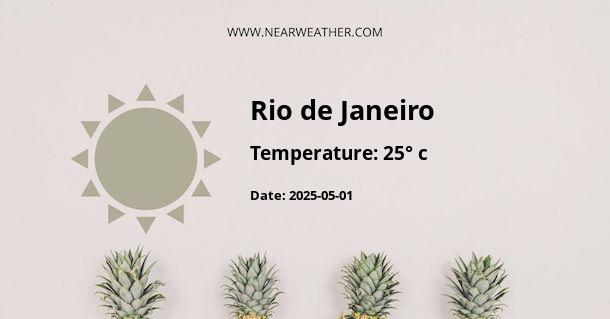Rio de Janeiro, Brazil: Climate and Weather Overview
Rio de Janeiro, commonly referred to as Rio, is a vibrant city known for its stunning landscapes, vibrant culture, and lively beaches. Understanding the climate and weather patterns of Rio is crucial for both tourists and residents to plan their activities and daily life effectively.
Climate
Rio de Janeiro has a tropical savanna climate, also known as a tropical wet and dry climate. The city experiences distinct wet and dry seasons throughout the year, contributing to its diverse climate.
Temperature
The average annual temperature in Rio de Janeiro ranges from 23°C to 27°C, providing a warm and inviting climate for most of the year. During the summer months, from December to March, temperatures can reach as high as 40°C, while in the winter months from June to September, the temperature can drop to around 18°C. The city experiences minimal variation in temperature throughout the year, making it an ideal destination for those seeking consistent warmth.
Rainfall
Rio de Janeiro experiences a distinct wet season from December to April, characterized by frequent, intense rainfall. The wet season brings much-needed precipitation to the region, with an average of 1000 to 1500 mm of rain annually. The dry season, from June to September, sees significantly less rainfall, contributing to a marked contrast in the city's landscape throughout the year.
Humidity
Humidity levels in Rio de Janeiro tend to be relatively high, especially during the wet season. Humidity can reach as high as 80%, contributing to the city's lush, green vegetation and tropical ambiance.
Weather by Month
Understanding the weather patterns in Rio de Janeiro month by month provides valuable insight for planning visits or activities. The following table outlines the average temperature and rainfall for each month in Rio:
| Month | Average Temperature (°C) | Rainfall (mm) |
|---|---|---|
| January | 25-30 | 120-160 |
| February | 25-30 | 120-160 |
| March | 24-29 | 100-140 |
| April | 23-28 | 80-120 |
| May | 22-27 | 60-100 |
| June | 20-25 | 40-80 |
| July | 20-25 | 40-80 |
| August | 20-25 | 40-80 |
| September | 21-26 | 60-100 |
| October | 22-27 | 80-120 |
| November | 23-28 | 100-140 |
| December | 24-29 | 120-160 |
Extreme Weather Events
While Rio de Janeiro generally enjoys a pleasant climate, the city is susceptible to occasional extreme weather events. These events can include heavy rain, tropical storms, and high winds. It is important for visitors and residents to stay informed about potential weather warnings and take necessary precautions when such events occur.
Conclusion
Rio de Janeiro's tropical savanna climate offers a warm and inviting atmosphere throughout the year, making it an ideal destination for travelers seeking consistent temperatures and lush landscapes. Understanding the distinct wet and dry seasons, as well as the variations in temperature, rainfall, and humidity, allows individuals to plan their activities and experiences in Rio with confidence.
Whether basking in the summer sun on Copacabana Beach or exploring the city's cultural offerings, a thorough understanding of Rio de Janeiro's climate and weather patterns enhances the overall experience of this vibrant and dynamic city.
A - Rio de Janeiro's Latitude is -22.902781 & Longitude is -43.207500.
A - Weather in Rio de Janeiro is 18° today.
A - Climate Conditions in Rio de Janeiro shows overcast clouds today.
A - Humidity in Rio de Janeiro is 85% today.
A - Wind speed in Rio de Janeiro is 15.77 km/h, flowing at 117° wind direction. today.
